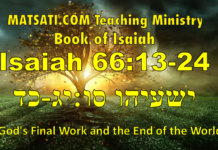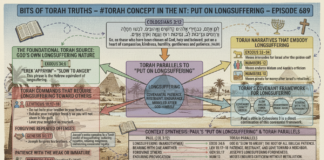Isaiah 21:1-9
The next couple chapters (Isaiah 21:1-29 and 22:1-25) provide an illustration of the fearful expectation of evil (calamity) or expectation of death. Though these things are imminent, the people continue to party and carry on as if nothing is going to happen. This has applications for today from the sense of what is going on in countries around the world, people continue on with their lives ignoring the warning signs and the policies their politicians are putting into place that destroys freedom and may lead to death on a massive scale and at the most the loss of liberty and the freedom to travel, and buy food for our families, etc. Isaiah prophetically speaks of the coming destruction, and the people are lulled asleep through their modes of entertainment, and they are not being spiritually discerning due to their having walked away from the ways of the God of Israel. Those who place their trust in man and in the strength of the flesh (Jeremiah 17:5-10) are tempted to place their reliance on both Babylon and Egypt. This timeframe is around 685-705 BC, when Sargon (Assyria) came to fight against Judah and Jerusalem. The Babylonians were defeated under Sennacherib in 702 BC. Isaiah 22:1-25 deals with Jerusalem and based upon Isaiah’s oracle, the people should repent and turn from their wicked ways, but instead they trust in their own ability to protect themselves, and hold parties and build tombs, all of this is done in the valley of vision. John Oswalt in his commentary writes in regard to Isaiah 21, “Verse 9 makes it appear that the entire address is to Babylon, but that is by no means clear, so that Penna and Kissane see vv. 1–5 as speaking about Judah. The strange title only compounds the difficulty. Also, it is not clear what destruction of Babylon is being spoken of. The reference to Elam and Media (v. 2) seems to point to the Persian overthrow in 539 B.C., as does v. 5 with its apparent allusion to Belshazzar’s feast (Dan. 5). As a result, given the rise of the Deutero-Isaiah hypothesis, many commentators assigned the oracle a date of about 540 (e.g., Delitzsch). Toward the end of the nineteenth century, however, such influential commentators as G. A. Smith and T. K. Cheyne reverted to the idea of Isaianic authorship on the grounds that the reference was to one of the defeats in 710, 702, or 689. More recently the move is back toward the 540 date or even later. The most recent treatment of the chapter concludes that both points of view are correct.14 A. A. Macintosh refers to the material as a palimpsest, by which he means that there was a sixth-century rewriting of an eighth-century document. This point of view seems to represent the most accurate observation of the data, for materials reflecting data from both centuries seem to be present (see below for further discussion).” We note how again the commentators doubt the authenticity of Isaiah and believe Isaiah’s words have been redacted or rewritten. The idea here is that in Isaiah’s prophecy, he provides a picture of both the near future and distant future within his oracle. The point is that Isaiah speaks of Babylon’s ultimate outcome, destruction and desolation, and of Judah if the people do not repent and turn from their wicked ways. These chapters from Isaiah 21 and 22 offer the continual warning to both Israel and to the nations of the earth concerning sin and the consequences to sin. The judgment of God will eventually come for those who do not trust in Him but turn to their own ways as opposed to His holy and righteous ways. We note how this also illustrates the mercy of God to allow a period of time for repentance and return according to 2 Peter 3:9.

אִגֶּרֶת פֶּטְרוֹס הַשְּׁנִיָּה פרק ג:ט
ט אֵין אַדֹנָי מְאַחֵר בַּדָּבָר אֲשֶׁר הִבְטִיחַ, כְּמוֹ שֶׁיֵּשׁ הַחוֹשְׁבִים זֹאת לאִחוּר, אֶלָּא שֶׁהוּא מַאֲרִיךְ אַפּוֹ לָנוּ; אֵין הוּא רוֹצֶה שֶׁיֹּאבַד אִישׁ, אֶלָּא שֶׁהַכֹּל יָבוֹאוּ לִידֵי תְּשׁוּבָה.
2 Peter 3:9
3:9 The Lord is not slack concerning his promise, as some men count slackness; but is longsuffering to us-ward, not willing that any should perish, but that all should come to repentance. (KJV, ܠܴܐ ܡܶܫܬܱ݁ܘܚܰܪ ܡܳܪܝܳܐ ܒ݁ܡܽܘܠܟܴ݁ܢܱ̈ܘܗ̄ܝ ܁ ܐܱܝܟ݂ ܕ݁ܐ̱ܢܴ̈ܫܺܝܢ ܫܽܘܘܚܳܪܴܐ ܡܰܣܒ݁ܪܻܝܢ ܇ ܐܷܠܴܐ ܡܰܓܱ݁ܪ ܪܾܘܚܶܗ ܡܶܛܾܠܴܬ݂ܟ݂ܽܘܢ ܆ ܒܱ݁ܕ݂ܠܴܐ ܨܴܒ݂ܶܐ ܕ݁ܐ̱ܢܳܫ ܢܺܐܒ݂ܰܕ݂ ܇ ܐܷܠܴܐ ܟܾ݁ܠܢܳܫ ܠܱܬ݂ܝܳܒ݂ܽܘܬ݂ܴܐ ܢܺܐܬ݂ܷܐ ܂)
The Lord is not slow (מְאַחֵר בַּדָּבָר) or as the Syriac writes ܠܴܐ ܡܶܫܬܱ݁ܘܚܰܪ ܡܳܪܝܳܐ “the Lord is not delayed” to fulfill his promise but does not want any to perish but that all should perform תְּשׁוּבָה (repent). We note that we say “perform Teshuvah,” because Teshuva (תְּשׁוּבָה) is something that we do, turning from sin and not simply a mental exercise. These things reveal to us how the Lord God is giving us time to repent. This is one of the most incredible attributes of God! As the Torah writes He is longsuffering, patience and loving showing mercy to thousands to those who love Him! (Shemot / Exodus 34:6-7, Tehillim / Psalm 103:8) The Lord God Almighty does these things for the purpose of allowing men to find themselves, come to their senses, believe in the Lord God and His Messiah and turn from their sins for salvation.
Isaiah opens chapter 21 saying the following:
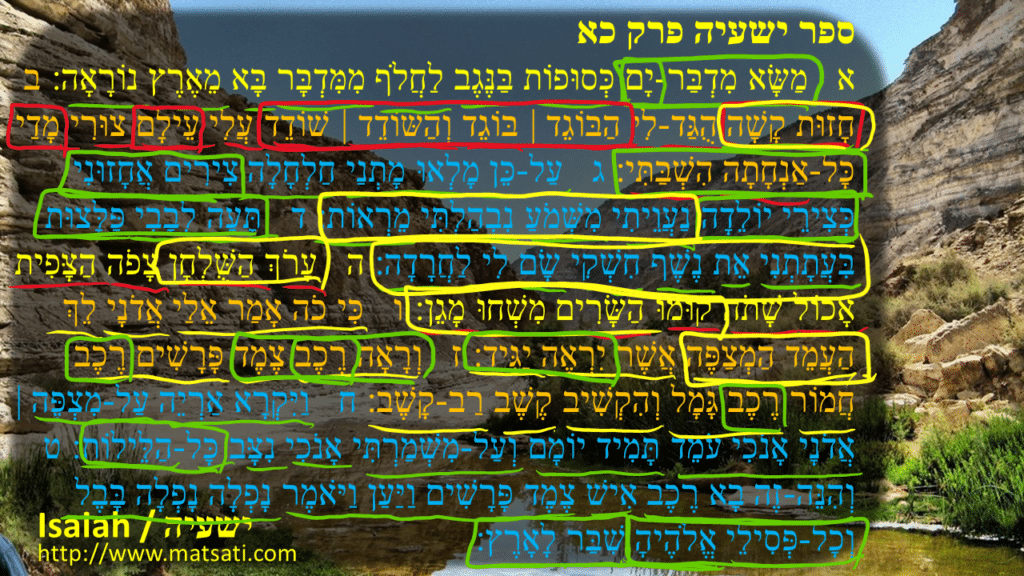
ספר ישעיה פרק כא
א מַשָּׂא מִדְבַּר-יָם כְּסוּפוֹת בַּנֶּגֶב לַחֲלֹף מִמִּדְבָּר בָּא מֵאֶרֶץ נוֹרָאָה:
Isaiah 21:1 states, “The burden of the desert of the sea. As whirlwinds in the south pass through; so it cometh from the desert, from a terrible land. (מַשָּׂא מִדְבַּר-יָם כְּסוּפוֹת בַּנֶּגֶב לַחֲלֹף מִמִּדְבָּר בָּא מֵאֶרֶץ נוֹרָאָה)” The opening words מַשָּׂא מִדְבַּר-יָם “the burden of the desert of the sea” it is interesting, since in the desert there is not much water to drink, and in the same way, in the middle of the sea, a saltwater sea, or ocean, there is also no water to drink. There are no references to fresh body of water here in the text with the use of the word יָם and יָם can refer to either a fresh body of water or the ocean, as in the case of the “Red Sea” (ים סוף) during the Exodus or יָם הַמֶּלַח “Dead sea” or literally “sea of salt.” This idea of the burden of the desert-sea may not be so far fetched as is claimed by most scholars that believe the word יָם is a textual corruption. The reason this belief is held by scholars is due to the absence of this word in the LXX (1 Τὸ ὅραμα τῆς ἐρήμου. Ὡς καταιγὶς διʼ ἐρήμου διέλθοι ἐξ ἐρήμου ἐρχομένη ἐκ γῆς, φοβερ) The idea from the Hebrew text suggests that Mesopotamia (Babylon), which is a desert region, may be a land whose expanse is like that of the sea, which would indicate that there is nothing there but dry land and may be the point of Isaiah mentioning in this way as Babylon is unable to be trusted as a reliable source for deliverance from war. This idea of מַשָּׂא מִדְבַּר-יָם “The burden of the desert of the sea” has some precedence in Jeremiah according to Jeremiah 50:38, 51:13, and 51:36.

ספר ירמיה פרק נ
לח חֹרֶב אֶל-מֵימֶיהָ וְיָבֵשׁוּ כִּי אֶרֶץ פְּסִלִים הִיא וּבָאֵימִים יִתְהֹלָלוּ:
Jeremiah 50:38
50:38 A drought is upon her waters; and they shall be dried up: for it is the land of graven images, and they are mad upon their idols. (KJV)
ספר ירמיה פרק נא
יג שֹׁכַנְתְּי [שֹׁכַנְתְּ] עַל-מַיִם רַבִּים רַבַּת אֹוצָרֹת בָּא קִצֵּךְ אַמַּת בִּצְעֵךְ:
Jeremiah 51:13
51:13 O thou that dwellest upon many waters, abundant in treasures, thine end is come, and the measure of thy covetousness. (KJV)
ספר ירמיה פרק נא
לו לָכֵן כֹּה אָמַר יְהֹוָה הִנְנִי-רָב אֶת-רִיבֵךְ וְנִקַּמְתִּי אֶת-נִקְמָתֵךְ וְהַחֲרַבְתִּי אֶת-יַמָּהּ וְהֹבַשְׁתִּי אֶת-מְקוֹרָהּ:
Jeremiah 51:36
51:36 Therefore thus saith the LORD; Behold, I will plead thy cause, and take vengeance for thee; and I will dry up her sea, and make her springs dry. (KJV)
We note that the text writes in Jeremiah 50:38 חֹרֶב אֶל-מֵימֶיהָ “dry upon her waters” where מֵימֶיהָ root word מים is not the same as יָם “sea or lake.” Jeremiah 51:13 speaks of מַיִם רַבִּים “many waters” and Jeremiah 51:36 states וְהַחֲרַבְתִּי אֶת-יַמָּהּ “and I will dry up her sea.” Note the consistency in the way in which Jeremiah is writing concerning the Lord drying up life giving waters due to their sins. There is an allusion to the sea and the storm according to the Pseudepigrapha of Solomon.
Pseudepigrapha Of Solomon, To Victory
1* My ear heard distress and the sound of war,
the blast of the trumpet sounding slaughter and destruction.
2* The sound of many people as of a violent storm,
as a raging fire storm sweeping through the wilderness.
3 And I said to my heart, Where, then, will God judge it?
(James H. Charlesworth, The Old Testament Pseudepigrapha and the New Testament: Expansions of the “Old Testament” and Legends, Wisdom, and Philosophical Literature, Prayers, Psalms and Odes, Fragments of Lost Judeo-Hellenistic Works, vol. 2 (New Haven; London: Yale University Press, 1985), 658.)
The idea here is to the sound of many people as being similar to a violent storm which is paralleled to the sound of war. So, מַשָּׂא מִדְבַּר-יָם כְּסוּפוֹת בַּנֶּגֶב לַחֲלֹף מִמִּדְבָּר בָּא מֵאֶרֶץ נוֹרָאָה “The burden of the desert of the sea. As whirlwinds in the south pass through, so it cometh from the desert, from a terrible land” seems to fit the narrative. We note the whirlwinds come out of the east and southeast out of the wilderness and this may be why Isaiah wrote what he did from the sense of the מִדְבַּר-יָם desert-sea (Jeremiah 4:11, 13:24, Hosea 13:15, Zechariah 9:14, Job 1:19).
ספר ישעיה פרק כא
ב חָזוּת קָשָׁה הֻגַּד-לִי הַבּוֹגֵד | בּוֹגֵד וְהַשּׁוֹדֵד | שׁוֹדֵד עֲלִי עֵילָם צוּרִי מָדַי כָּל-אַנְחָתָה הִשְׁבַּתִּי:
Isaiah 21:2 states, “A grievous vision is declared unto me; (חָזוּת קָשָׁה הֻגַּד-לִי) the treacherous dealer dealeth treacherously, and the spoiler spoileth. (הַבּוֹגֵד | בּוֹגֵד וְהַשּׁוֹדֵד | שׁוֹדֵד) Go up, O Elam: besiege, O Media; all the sighing thereof have I made to cease. (עֲלִי עֵילָם צוּרִי מָדַי כָּל-אַנְחָתָה הִשְׁבַּתִּי)” Here Isaiah says חָזוּת קָשָׁה “a difficult/stern/grievous vision” which speaks to the reality of war. (1 Kings 14:6, Tehillim / Psalms 60:5) This phrase in Hebrew הַבּוֹגֵד | בּוֹגֵד וְהַשּׁוֹדֵד | שׁוֹדֵד means literally “deal treacherously | deal treacherously | devastate | devastate.” the vertical line paseq (פָּסֵק) ⟨׀⟩ originates from Biblical Hebrew. This symbol is not on a standard Hebrew keyboard, a vertical bar ⟨|⟩ is often used instead. However, it is seldom if ever used in modern Israeli Hebrew. Like much Biblical Hebrew punctuation, the meaning of the paseq is not known, although a number of hypotheses exist. The word itself means “separator.” The Westminster Leningrad Codex contains over 500 paseqs; William Wickes, an influential scholar in this area, divide them into nine classes; Wilhelm Gesenius, drawing on Wickes, divided them into five:
- as a divider between two words which end and begin with the same letters, e.g. שָׁלוֹם׀ מַ (Shalom, ma)
- between identical or very similar words, e.g. רַקדָן׀ רָקַד (the dancer danced)
- between words which are to a high degree contradictory, e.g. אֱלֹהִים׀ רֶשַׁע (God, evil)
- between words otherwise liable to be wrongly connected, e.g. כַּף׀ תּוֹר, which prevents the somewhat bizarre phrase כַּף (kaf, spoon) תּוֹר (tor, queue) from being wrongly read as כַּפְתּוֹר (kaftor), meaning button.
- and lastly, between heterogeneous terms, as Eleazar the High Priest, and Joshua (אֶלְעָזָ֣ר הַכֹּהֵ֣ן׀ וִיהוֹשֻׁ֪עַ—see context in Joshua 19:51)
Comparison of Isaiah 21:2 to the LXX and the TgJ reveals the following:
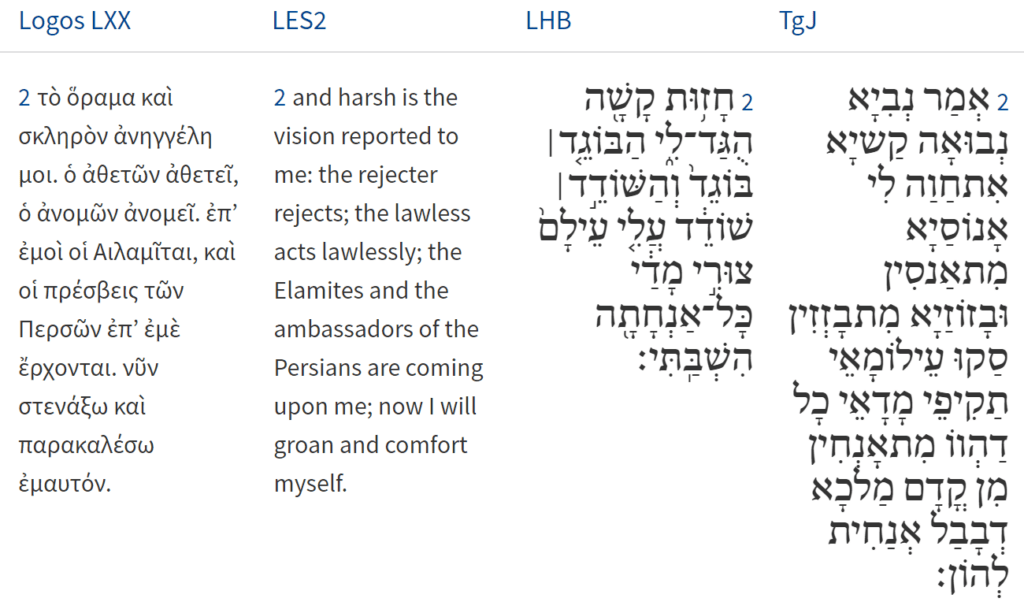
Note according to the LXX, the rabbis translate הַבּוֹגֵד | בּוֹגֵד וְהַשּׁוֹדֵד | שׁוֹדֵד as ὁ ἀθετῶν ἀθετεῖ, ὁ ἀνομῶν ἀνομεῖ. This text is interesting, let’s analyze this a little further, we note that the same root stem is repeated twice ἀθετῶν ἀθετεῖ and ἀνομῶν ἀνομεῖ.
Ἀθετῶν – verb, present, active, participle, singular, nominative, masculine
ἀθετεῖ – verb, present, active, indicative, third person, singular
ἀνομῶν – verb, present, active, participle, singular, nominative, masculine
Ἀνομεῖ – verb, present, active, indicative, third person, singular
These are verbs which are words of action that are first written as a present, active participle, and then as a present active indicative. We note that these words are all written in the active voice. So, the Ἀθετῶν “rejecting” ἀθετεῖ “they reject.” The word ἀνομῶν is from the root anomia meaning lawless. So, ἀνομῶν “lawless acts” Ἀνομεῖ “they act lawlessly.” Note the parallel to הַבּוֹגֵד | בּוֹגֵד וְהַשּׁוֹדֵד | שׁוֹדֵד “deal treacherously | deal treacherously | devastate | devastate.” The Greek and Hebrew draw parallels to lawlessness being as one who chooses devastation, and to be treacherous is to reject the ways of God. This speaks to the types of people that God is bringing upon the nation to destroy them. He is bringing lawless people to spread ruin and disaster to those who live in unrepentant sin. The word בּוֹגֵד is often used of treachery in social relations such as examples of adultery, in passages such as Isaiah 24:16, 33:1, and Habakkuk 1:13. This word seems to express in general terms the deceits and treacheries and all the violations of the social order that accompany war. The country being referred to is מָדַי Media the Greek translates as Περσῶν Persia. Note also עֵילָם Elam is the great plain east of the lower Tigris River. All of these things describe the חָזוּת קָשָׁה “a difficult/stern/grievous vision” that Isaiah has been given. These things describe the awfulness of war in treachery, destruction, and violence, everything that one could imagine happens in times of war. Isaiah says כָּל-אַנְחָתָה הִשְׁבַּתִּי “I will stop all her groaning” which speaks of the oppression that is placed upon a nation by another nation. We note that this putting a stop to the oppression is not exactly done in a nice way based upon the descriptions given by the prophet Isaiah.
ספר ישעיה פרק כא
ג עַל-כֵּן מָלְאוּ מָתְנַי חַלְחָלָה צִירִים אֲחָזוּנִי כְּצִירֵי יוֹלֵדָה נַעֲוֵיתִי מִשְּׁמֹעַ נִבְהַלְתִּי מֵרְאוֹת: ד תָּעָה לְבָבִי פַּלָּצוּת בִּעֲתָתְנִי אֵת נֶשֶׁף חִשְׁקִי שָֹם לִי לַחֲרָדָה:
Isaiah 21:3 states, “Therefore are my loins filled with pain: pangs have taken hold upon me, as the pangs of a woman that travaileth: (עַל-כֵּן מָלְאוּ מָתְנַי חַלְחָלָה צִירִים אֲחָזוּנִי כְּצִירֵי יוֹלֵדָה) I was bowed down at the hearing of it; I was dismayed at the seeing of it. (נַעֲוֵיתִי מִשְּׁמֹעַ נִבְהַלְתִּי מֵרְאוֹת)” Isaiah 21:4 “My heart panted, fearfulness affrighted me: the night of my pleasure hath he turned into fear unto me. (תָּעָה לְבָבִי פַּלָּצוּת בִּעֲתָתְנִי אֵת נֶשֶׁף חִשְׁקִי שָֹם לִי לַחֲרָדָה)” Here Isaiah speaks of how inwardly the vision that is given to him, he can hardly bear. He describes his physical traits which he says this news has caused him to double over in pain צִירִים אֲחָזוּנִי כְּצִירֵי יוֹלֵדָה the pain seized him like the pain of child birth. Isaiah goes on saying תָּעָה לְבָבִי פַּלָּצוּת בִּעֲתָתְנִי אֵת נֶשֶׁף חִשְׁקִי שָֹם לִי לַחֲרָדָה “my heart staggers in horror, I am terrified the twilight I love causes me to tremble.” Here Jeremiah expresses the fear of Babylon coming and destroying the nation. The imagery that comes to mind in times of war, are related to the suffering and destruction of individual persons, bleeding due to the sword, suffering and death, all of the horrors of war, rape, destruction of families etc.
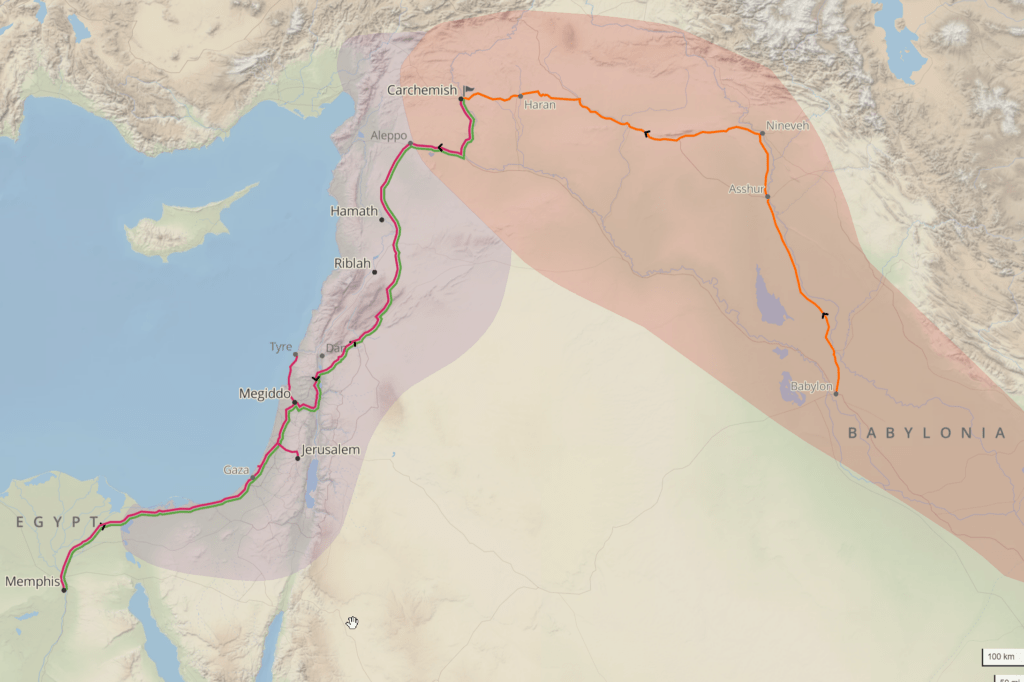
This is a map of the path of the Babylonian army. For example, Babylon fought Carchemish in 605 BC. The Babylonian captivity or Babylonian exile is the period in Jewish history during which a large number of Judeans from the ancient Kingdom of Judah were captives in Babylon, the capital city of the Neo-Babylonian Empire. The Babylonian king brought his army to fight against Jerusalem in 587 BC. After the Battle of Carchemish in 605 BC, the Babylonian king Nebuchadnezzar 2nd besieged Jerusalem, which resulted in tribute being paid by the Judean king Jehoiakim. In the fourth year of Nebuchadnezzar 2nd’s reign, Jehoiakim refused to pay further tribute, which led to another siege of the city in Nebuchadnezzar 2nd’s seventh year that culminated in the death of Jehoiakim and the exile to Babylonia of his successor Jeconiah, his court, and many others; Jeconiah’s successor Zedekiah and others were exiled in Nebuchadnezzar 2nd’s 18th year; and a later deportation occurred in Nebuchadnezzar 2nd’s 23rd year. The dates, numbers of deportations, and numbers of deportees given in the biblical accounts vary. These deportations are dated to 597 BCE for the first, with others dated at 587/586 BCE and 582/581 BCE, respectively. (Info taken from: Dunn, James G.; Rogerston, John William (2003). Eerdmans Commentary on the Bible. Wm. B. Eerdmans Publishing. p. 545. ISBN 978-0-8028-3711-0.) Here Isaiah is speaking of the agony, the pain of his vision seeing these things happen to Judah and Jerusalem. Isaiah states נַעֲוֵיתִי מִשְּׁמֹעַ נִבְהַלְתִּי מֵרְאוֹת “I was bent because of hearing and terrified because of seeing.” We note that he both heard and saw the destruction through supernatural means. Based upon Isaiah’s words he was overwhelmed with terror due to these events that he saw.
ספר ישעיה פרק כא
ה עָרֹךְ הַשֻּׁלְחָן צָפֹה הַצָּפִית אָכוֹל שָׁתֹה קוּמוּ הַשָּׂרִים מִשְׁחוּ מָגֵן:
Isaiah 21:5 states, “Prepare the table, watch in the watchtower, eat, drink: arise, ye princes, and anoint the shield. (עָרֹךְ הַשֻּׁלְחָן צָפֹה הַצָּפִית אָכוֹל שָׁתֹה קוּמוּ הַשָּׂרִים מִשְׁחוּ מָגֵן)” This verse reminds us of Daniel 5 and Belshazzar’s feast, the story of the writing on the wall, tells how Belshazzar holds a great feast and drinks from the vessels that had been looted in the destruction of the First Temple. A hand appears and writes on the wall. The terrified Belshazzar calls for his wise men, but they are unable to read the writing. The queen advises him to send for Daniel, renowned for his wisdom. Daniel reminds Belshazzar that his father Nebuchadnezzar, when he became arrogant, was thrown down until he learned that God has sovereignty over the kingdom of men. The idea here is to the pride of Babylon, where pride leads to sin, and sin leads to moral depravity. Biblical examples are from Sodom and Gomorrah (Bereshit / Genesis 19:14). Yeshua spoke of the last days on the return of the Son of Man according to Mark 13.
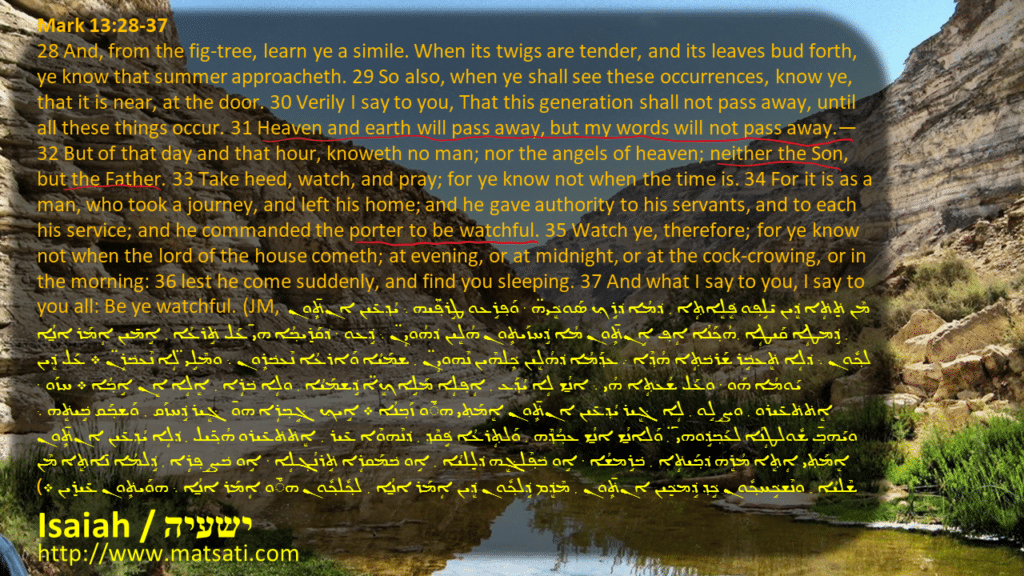
הַבְּשׂוֹרָה עַל־פִּי מַרְקוֹס פרק יג
לִמְדוּ אֶת הַמָּשָׁל מִן הַתְּאֵנָה׃ כַּאֲשֶׁר עֲנָפֶיהָ מִתְרַכְּכִים וְהֶעָלִים צָצִים יוֹדְעִים אַתֶּם שֶׁהַקַּיִץ קָרוֹב.כֵּן גַּם אַתֶּם, כְּשֶׁתִּרְאוּ אֶת הַדְּבָרִים הָאֵלֶּה מִתְקַיְּמִים דְּעוּ כִּי קָרוֹב הוּא בַּפֶּתַח.אָמֵן. אוֹמֵר אֲנִי לָכֶם, לֹא יַעֲבֹר הַדּוֹר הַזֶּה עַד אֲשֶׁר יִהְיוּ כָּל אֵלֶּה.הַשָּׁמַיִם וְהָאָרֶץ יַעַבְרוּ וּדְבָרַי לֹא יַעַבְרוּ.אֲבָל אֶת הַיּוֹם הַהוּא אוֹ הַשָּׁעָה אֵין אִישׁ יוֹדֵעַ, גַּם לֹא הַמַּלְאָכִים בַּשָּׁמַיִם וְגַם לֹא הַבֵּן, אֶלָּא הָאָב.הִזָּהֲרוּ, הֱיוּ עֵרִים, כִּי אֵינְכֶם יוֹדְעִים מָתַי הָעֵת.דּוֹמֶה הַדָּבָר לְאִישׁ הַיּוֹצֵא לְמַסָּע. כְּשֶׁעָזַב אֶת בֵּיתוֹ נָתַן סַמְכוּת לַעֲבָדָיו, לְכָל אֶחָד אֶת מְלַאכְתּוֹ, וְעַל הַשּׁוֹעֵר צִוָּה לַעֲמֹד עַל הַמִּשְׁמָר.לָכֵן עִמְדוּ עַל הַמִּשְׁמָר, כִּי אֵינְכֶם יוֹדְעִים מָתַי יָבוֹא בַּעַל הַבַּיִת, אִם בָּעֶרֶב אוֹ בַּחֲצוֹת הַלַּיְלָה, אִם בְּעֵת קְרִיאַת הַתַּרְנְגוֹל אוֹ בַּבֹּקֶר,פֶּן יָבוֹא פִּתְאוֹם וְיִמְצָא אֶתְכֶם יְשֵׁנִים.אֶת אֲשֶׁר אֲנִי אוֹמֵר לָכֶם אוֹמֵר אֲנִי לַכֹּל׃ עִמְדוּ עַל הַמִּשְׁמָר!״
Mark 13:28-37
28 And, from the fig-tree, learn ye a simile. When its twigs are tender, and its leaves bud forth, ye know that summer approacheth. 29 So also, when ye shall see these occurrences, know ye, that it is near, at the door. 30 Verily I say to you, That this generation shall not pass away, until all these things occur. 31 Heaven and earth will pass away, but my words will not pass away.—32 But of that day and that hour, knoweth no man; nor the angels of heaven; neither the Son, but the Father. 33 Take heed, watch, and pray; for ye know not when the time is. 34 For it is as a man, who took a journey, and left his home; and he gave authority to his servants, and to each his service; and he commanded the porter to be watchful. 35 Watch ye, therefore; for ye know not when the lord of the house cometh; at evening, or at midnight, or at the cock-crowing, or in the morning: 36 lest he come suddenly, and find you sleeping. 37 And what I say to you, I say to you all: Be ye watchful. (JM, ܡܶܢ ܬܻ݁ܬܴ݁ܐ ܕܷ݁ܝܢ ܝܺܠܱܦ݂ܘ ܦܷ݁ܠܷܐܬ݂ܴܐ ܂ ܕ݁ܡܳܐ ܕ݁ܪܱܟ݂ ܣܰܘܟܷ݁ܝ̈ܗ ܁ ܘܰܦ݂ܪܱܥܘ ܛܱܪ̈ܦ݂ܶܝܗ ܆ ܝܳܕ݂ܥܺܝܢ ܐܢ̄ܬܾ݁ܘܢ ܂ ܕܱ݁ܡܛܴܐ ܩܰܝܛܴܐ ܂ܗܳܟ݂ܰܢܳܐ ܐܴܦ݂ ܐܱܢ̄ܬܾ݁ܘܢ ܡܳܐ ܕܱ݁ܚܙܰܝܬܾ݁ܘܢ ܗܳܠܷܝܢ ܕ݁ܗܳܘܝܴ̈ܢ ܆ ܕܱ݁ܥܘ ܁ ܕ݁ܩܰܪܻܝܒ݂ܳܐ ܗ̄ܝ ܥܰܠ ܬܱ݁ܪܥܳܐ ܂ ܐܱܡܺܝܢ ܐܴܡܰܪ ܐ̱ܢܳܐ ܠܟ݂ܽܘܢ ܆ ܕ݁ܠܴܐ ܬܷ݁ܥܒܱ݁ܪ ܫܰܪܒ݁ܬ݂ܴܐ ܗܳܕ݂ܶܐ ܇ ܥܕ݂ܰܡܳܐ ܕ݁ܗܳܠܷܝܢ ܟܾ݁ܠܗܶܝܢ ܢܶܗܘܝܴ̈ܢ ܂ ܫܡܰܝܳܐ ܘܰܐܪܥܳܐ ܢܶܥܒ݁ܪܾܘܢ ܆ ܘܡܶܠܱܝ̈ ܠܴܐ ܢܶܥܒ݁ܪܴ̈ܢ ܀ ܥܰܠ ܕܷ݁ܝܢ ܝܰܘܡܳܐ ܗܰܘ ܁ ܘܥܰܠ ܫܳܥܬ݂ܴܐ ܗܳܝ ܆ ܐ̱ܢܳܫ ܠܴܐ ܝܳܕ݂ܰܥ ܂ ܐܴܦ݂ܠܴܐ ܡܰܠܱܐܟ݂ܷ̈ܐ ܕܱ݁ܫܡܰܝܳܐ ܂ ܘܠܴܐ ܒ݁ܪܴܐ ܂ ܐܷܠܴܐ ܐܷܢ ܐܱܒ݂ܳܐ ܀ ܚܙܰܘ ܁ ܐܷܬ݁ܬ݁ܥܺܝܪܘ ܂ ܘܨܱܠܱܘ ܂ ܠܴܐ ܓܷ݁ܝܪ ܝܳܕ݂ܥܺܝܢ ܐܢ̄ܬܾ݁ܘܢ ܐܷܡܰܬ݂ܝ ܗ̄ܽܘ ܙܰܒ݂ܢܳܐ ܀ ܐܱܝܟ݂ ܓܱ݁ܒ݂ܪܴܐ ܗ̄ܘ ܓܷ݁ܝܪ ܕܱ݁ܚܙܰܩ ܂ ܘܰܫܒ݂ܰܩ ܒܱ݁ܝܬܷ݁ܗ ܆ ܘܝܰܗ̄ܒ݂ ܫܽܘܠܛܴܢܳܐ ܠܥܰܒ݂ܕܱ݁ܘܗ̄ܝ̈ ܂ ܘܰܠܐ̱ܢܳܫ ܐ̱ܢܳܫ ܥܒ݂ܳܕ݂ܶܗ ܂ ܘܰܠܬ݂ܴܪܥܳܐ ܦܱ݁ܩܶܕ݂ ܂ ܕ݁ܢܶܗܘܶܐ ܥܺܝܪ ܂ ܐܷܬ݁ܬ݁ܥܺܝܪܘ ܗܳܟ݂ܺܝܠ ܂ ܕ݁ܠܴܐ ܝܳܕ݂ܥܺܝܢ ܐܢ̄ܬܾ݁ܘܢ ܐܷܡܰܬ݂ܝ ܐܴܬ݂ܷܐ ܡܳܪܷܗ ܕ݁ܒ݂ܰܝܬܴ݁ܐ ܂ ܒ݁ܪܱܡܫܳܐ ܁ ܐܱܘ ܒ݁ܦ݂ܶܠܓܷ݁ܗ ܕ݁ܠܻܠܝܳܐ ܂ ܐܱܘ ܒ݁ܡܰܩܪܴܐ ܬܱ݁ܪܢܳܓ݂ܠܴܐ ܁ ܐܱܘ ܒ݁ܨܱܦ݂ܪܴܐ ܂ ܕܱ݁ܠܡܳܐ ܢܺܐܬ݂ܷܐ ܡܶܢ ܫܶܠܝܳܐ ܂ ܘܢܶܫܟܱ݁ܚܟ݂ܽܘܢ ܟܱ݁ܕ݂ ܕܱ݁ܡܟܻ݁ܝܢ ܐܢ̄ܬܾ݁ܘܢ ܂ ܡܶܕܷ݁ܡ ܕܱ݁ܠܟ݂ܽܘܢ ܕܷ݁ܝܢ ܐܴܡܰܪ ܐ̱ܢܳܐ ܂ ܠܟ݂ܽܠܟ݂ܽܘܢ ܗ̄ܽܘ ܐܴܡܰܪ ܐ̱ܢܳܐ ܆ ܗܘܰܝܬܾ݁ܘܢ ܥܺܝܪܻܝܢ ܀)
Yeshua states לִמְדוּ אֶת הַמָּשָׁל מִן הַתְּאֵנָה “learn from the parable of the fig” drawing in a parallel to knowing the time in which one lives and to being watchful of the Lord’s coming as it will come at a time when one does not know. Now the story of Belshazzar follows the same immediacy of destruction, since in that same night he was killed, and the kingdom of Babylon fell taken over by the Medes and the Persians. This is the modus operandi of judgment, the one who is deadened to sin, filled with moral decay, as dead, and the immediacy of destruction coming. We note that the Hebrew text writes to watch, eat, and drink, and then ק֥וּמוּ הַשָּׂרִ֖ים מִשְׁח֥וּ מָגֵֽן “raise princes and anoint with oil your swords” in which the KJV translates as “prepare your swords” meaning that they are to prepare for war. The point of all of these things is to repent daily and seek the Lord God in heaven in His Messiah Yeshua.
ספר ישעיה פרק כא
ו כִּי כֹה אָמַר אֵלַי אֲדֹנָי לֵךְ הַעֲמֵד הַמְצַפֶּה אֲשֶׁר יִרְאֶה יַגִּיד: ז וְרָאָה רֶכֶב צֶמֶד פָּרָשִׁים רֶכֶב חֲמוֹר רֶכֶב גָּמָל וְהִקְשִׁיב קֶשֶׁב רַב-קָשֶׁב:
Isaiah 21:6 states, “For thus hath the LORD said unto me, Go, set a watchman, let him declare what he seeth. (כִּי כֹה אָמַר אֵלַי אֲדֹנָי לֵךְ הַעֲמֵד הַמְצַפֶּה אֲשֶׁר יִרְאֶה יַגִּיד)” Isaiah 21:7 “And he saw a chariot with a couple of horsemen, a chariot of asses, and a chariot of camels; and he hearkened diligently with much heed: (וְרָאָה רֶכֶב צֶמֶד פָּרָשִׁים רֶכֶב חֲמוֹר רֶכֶב גָּמָל וְהִקְשִׁיב קֶשֶׁב רַב-קָשֶׁב)” Here the Lord tells Jeremiah to set a watchman (הַעֲמֵ֣ד הַֽמְצַפֶּ֔ה) and let him declare what he sees (אֲשֶׁר יִרְאֶה יַגִּיד). This speaks of a warning to begin to watch for the coming of Babylon, the nation that will be brought for judgment. (Habakkuk 2:1, 2:11-12, Isaiah 52:8) Yeshua again drew upon this immediacy of judgment concerning the last days, where there will be disasters in nature (Matthew 24:7, 24:29), disasters in society (Matthew 24:6), and in the body of believers (Matthew 24:9-12). The one who recognizes these signs just as Isaiah is saying concerning Babylon, in parallel fashion the Messiah is coming to bring judgment and deliverance for those who are faithful and continue to seek the Lord God in heaven, the God of Israel, and His Messiah Yeshua. Isaiah 21:7 speaks to what the watchman saw, a couple of horsemen, chariots, camels, and they are being driven very hard in their direction. This is a good description of the immediacy of not just the coming army but of the coming destruction too. Isaiah says וְרָ֣אָה רֶ֗כֶב צֶ֚מֶד פָּֽרָשִׁ֔ים “and see a pair of chariots” this may be analogous to a company of riders coming as a collective whole, being a reference to the army of Babylon. This is made clearer according to Isaiah 21:9 וְהִנֵּה-זֶה בָא רֶכֶב אִישׁ צֶמֶד פָּרָשִׁים “behold this comes a chariot of men, a pair of horsemen.” The idea is that רֶ֗כֶב is used as “chariotry / riders” as a multiplicity (Isaiah 43:17, Jeremiah 46:9) according to John Oswalt. David writes according to Tehillim / Psalms 68:18-19 the following:
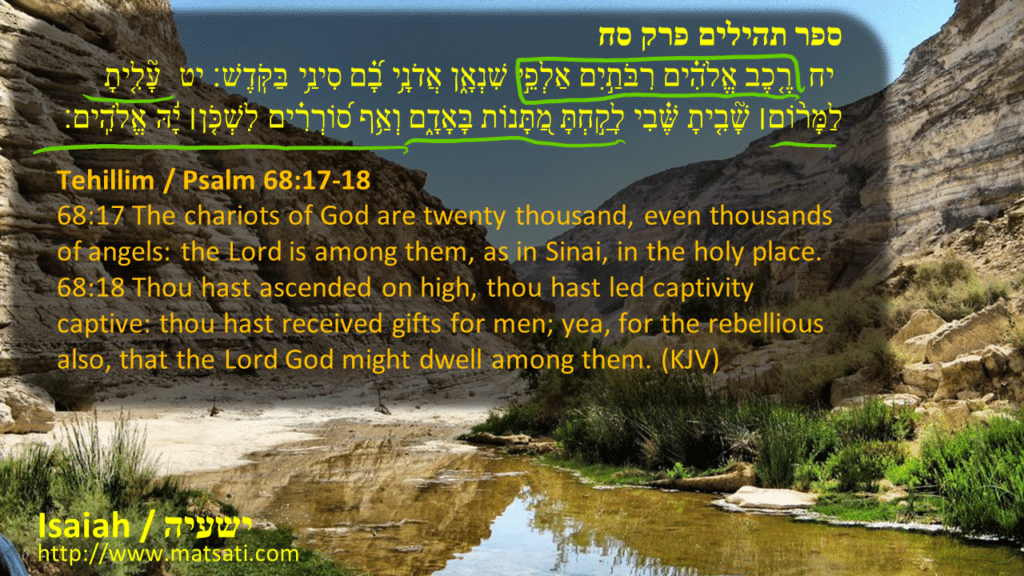
ספר תהילים פרק סח
יח רֶ֤כֶב אֱלֹהִ֗ים רִבֹּתַ֣יִם אַלְפֵ֣י שִׁנְאָ֑ן אֲדֹנָ֥י בָ֝֗ם סִינַ֥י בַּקֹּֽדֶשׁ׃ יט עָ֘לִ֤יתָ לַמָּר֨וֹם׀ שָׁ֘בִ֤יתָ שֶּׁ֗בִי לָקַ֣חְתָּ מַ֭תָּנוֹת בָּאָדָ֑ם וְאַ֥ף ס֝וֹרְרִ֗ים לִשְׁכֹּ֤ן׀ יָ֬הּ אֱלֹהִֽים׃
Tehillim / Psalm 68:17-18
68:17 The chariots of God are twenty thousand, even thousands of angels: the Lord is among them, as in Sinai, in the holy place. 68:18 Thou hast ascended on high, thou hast led captivity captive: thou hast received gifts for men; yea, for the rebellious also, that the Lord God might dwell among them. (KJV)
Here David describes the רֶ֤כֶב chariot of God as thousands of angels. This adds support for our previous interpretation asthr chariot being a multiplicity of riders. Isaiah is seeing Babylon coming, and this is very disheartening due to the unrepentant nature of the people, the inhabitants of Judah and Jerusalem.
ספר ישעיה פרק כא
ח וַיִּקְרָא אַרְיֵה עַל-מִצְפֶּה | אֲדֹנָי אָנֹכִי עֹמֵד תָּמִיד יוֹמָם וְעַל-מִשְׁמַרְתִּי אָנֹכִי נִצָּב כָּל-הַלֵּילוֹת: ט וְהִנֵּה-זֶה בָא רֶכֶב אִישׁ צֶמֶד פָּרָשִׁים וַיַּעַן וַיֹּאמֶר נָפְלָה נָפְלָה בָּבֶל וְכָל-פְּסִילֵי אֱלֹהֶיהָ שִׁבַּר לָאָרֶץ:
Isaiah 21:8 states, “And he cried, A lion: My lord, I stand continually upon the watchtower in the daytime, and I am set in my ward whole nights: (וַיִּקְרָא אַרְיֵה עַל-מִצְפֶּה | אֲדֹנָי אָנֹכִי עֹמֵד תָּמִיד יוֹמָם וְעַל-מִשְׁמַרְתִּי אָנֹכִי נִצָּב כָּל-הַלֵּילוֹת)” Isaiah 21:9 “And, behold, here cometh a chariot of men, with a couple of horsemen. And he answered and said, (וְהִנֵּה-זֶה בָא רֶכֶב אִישׁ צֶמֶד פָּרָשִׁים וַיַּעַן וַיֹּאמֶר) Babylon is fallen, is fallen; and all the graven images of her gods he hath broken unto the ground. (נָפְלָה נָפְלָה בָּבֶל וְכָל-פְּסִילֵי אֱלֹהֶיהָ שִׁבַּר לָאָרֶץ)” Isaiah opens with crying out as a lion, interesting the LXX translates this as follows:
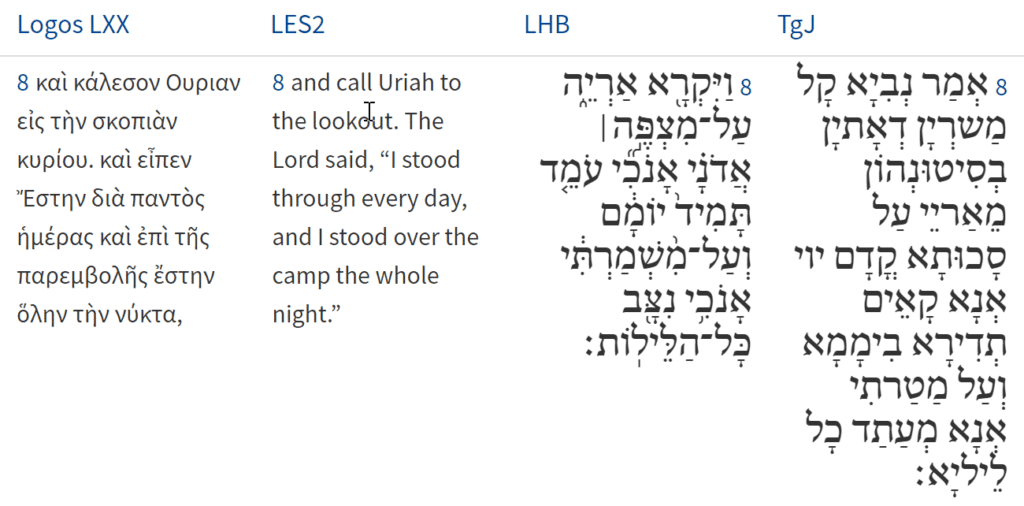
The Septuagint translated “And he cried, A lion: My lord, I stand continually upon the watchtower in the daytime, and I am set in my ward whole nights: (וַיִּקְרָא אַרְיֵה עַל-מִצְפֶּה | אֲדֹנָי אָנֹכִי עֹמֵד תָּמִיד יוֹמָם וְעַל-מִשְׁמַרְתִּי אָנֹכִי נִצָּב כָּל-הַלֵּילוֹת)” as καὶ κάλεσον Ουριαν εἰς τὴν σκοπιὰν κυρίου. καὶ εἶπεν Ἔστην διὰ παντὸς ἡμέρας καὶ ἐπὶ τῆς παρεμβολῆς ἔστην ὅλην τὴν νύκτα. We note that the word κάλεσον is a verb, aorist, active, imperative, and provides a continuous action of calling / crying out. Also, this word Ουριαν does not mean Uriah. This appears to be a transliteration of אַרְיֵה meaning “lion.” κάλεσον Ουριαν speaks of the perseverance of the watchman to look from the watchtower (מִצְפֶּה) as a lion watches and as a lion stands guard she roars. The TgJ translates as saying “21:8 The prophet said, the voice of armies, coming with coats of mail, is as a lion; and I stand continually upon the watchtower before the Lord in the day, and as a guard I stand all the night.” (TgJ) Isaiah continues in Isaiah 21:9 explaining what he means by these previous two verses saying, נָפְלָה נָפְלָה בָּבֶל וְכָל-פְּסִילֵי אֱלֹהֶיהָ שִׁבַּר לָאָרֶץ “fallen, fallen is Babylon and all the graven images of her gods he hath broken unto the ground.” These things reveal to us how Isaiah is warning the people to keep watch, for the destruction of Babylon is coming. We note that this phrase “fallen, fallen is Babylon” reminds us of the NT text according to Revelation 18:2 which states, נָפְלָה נָפְלָה בָּבֶל הַגְּדוֹלָה “fallen, fallen is Babylon the great.” Isaiah speaks to a time of watchfulness, similar to what Yeshua said on multiple occasions:
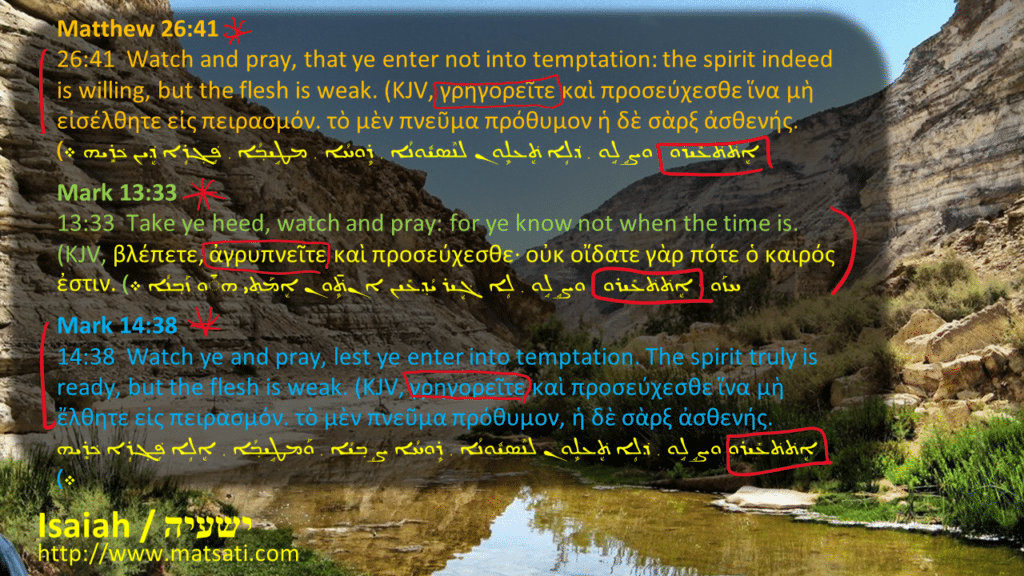
Matthew 26:41
26:41 Watch and pray, that ye enter not into temptation: the spirit indeed is willing, but the flesh is weak. (KJV, γρηγορεῖτε καὶ προσεύχεσθε ἵνα μὴ εἰσέλθητε εἰς πειρασμόν. τὸ μὲν πνεῦμα πρόθυμον ἡ δὲ σὰρξ ἀσθενής. ܐܷܬ݁ܬ݁ܥܺܝܪܘ ܁ ܘܨܱܠܱܘ ܂ ܕ݁ܠܴܐ ܬܷ݁ܥܠܾܘܢ ܠܢܶܣܝܽܘܢܳܐ ܂ ܪܾܘܚܳܐ ܂ ܡܛܱܝܒ݂ܳܐ ܂ ܦܱ݁ܓ݂ܪܴܐ ܕܷ݁ܝܢ ܟ݁ܪܻܝܗ ܀)
Mark 13:33
13:33 Take ye heed, watch and pray: for ye know not when the time is. (KJV, βλέπετε, ἀγρυπνεῖτε καὶ προσεύχεσθε· οὐκ οἴδατε γὰρ πότε ὁ καιρός ἐστιν. ܚܙܰܘ ܁ ܐܷܬ݁ܬ݁ܥܺܝܪܘ ܂ ܘܨܱܠܱܘ ܂ ܠܴܐ ܓܷ݁ܝܪ ܝܳܕ݂ܥܺܝܢ ܐܢ̄ܬܾ݁ܘܢ ܐܷܡܰܬ݂ܝ ܗ̄ܽܘ ܙܰܒ݂ܢܳܐ ܀)
Mark 14:38
14:38 Watch ye and pray, lest ye enter into temptation. The spirit truly is ready, but the flesh is weak. (KJV, γρηγορεῖτε καὶ προσεύχεσθε ἵνα μὴ ἔλθητε εἰς πειρασμόν. τὸ μὲν πνεῦμα πρόθυμον, ἡ δὲ σὰρξ ἀσθενής. ܐܷܬ݁ܬ݁ܥܺܝܪܘ ܘܨܱܠܱܘ ܂ ܕ݁ܠܴܐ ܬܷ݁ܥܠܾܘܢ ܠܢܶܣܝܽܘܢܳܐ ܂ ܪܾܘܚܳܐ ܨܴܒ݂ܝܳܐ ܂ ܘܰܡܛܱܝܒ݂ܳܐ ܂ ܐܷܠܴܐ ܦܱ݁ܓ݂ܪܴܐ ܟ݁ܪܻܝܗ ܀)
The Greek word used in all three of these verses is the stem ἐγείρω meaning “to cause someone to wake from sleep, wake, rouse.” In Matthew 26:41 and Mark 14:38 is written as γρηγορεῖτε is a verb, present, active, imperative, second person, plural form which provides this continuous action of persevering to keep watch, to be alert and to keep one’s eyes open, to be watchful. The Peshitta uses the word ܐܷܬ݁ܬ݁ܥܺܝܪܘ and ettaphal verb, imperative, masculine, second person plural, meaning “to cause one to be awake.” These words have the sense of being vigilant to remain awake, doing everything it takes to remain awake to be watchful. The Greek word ἀγρυπνεῖτε in Mark 13:33 means “to be sleepless” or “to keep oneself away for the purpose of watching.” These variations on the Greek words are similar but different from the sense that the Mark 13:33 case has the emphasis on not sleeping. This is the prototypical activity of the watchman who sits in the watchtower looking to protect his people, and himself. We ask the question about these watchmen, whether they will be faithful in their task, or unfaithful falling asleep like the ten virgins that Yeshua spoke according to Matthew 25:1-13? We compare Isaiah 21:7 with Isaiah 21:9.
ספר ישעיה פרק כא
ז וְרָאָה רֶכֶב צֶמֶד פָּרָשִׁים רֶכֶב חֲמוֹר רֶכֶב גָּמָל וְהִקְשִׁיב קֶשֶׁב רַב-קָשֶׁב:
ספר ישעיה פרק כא
ט וְהִנֵּה-זֶה בָא רֶכֶב אִישׁ צֶמֶד פָּרָשִׁים וַיַּעַן וַיֹּאמֶר נָפְלָה נָפְלָה בָּבֶל וְכָל-פְּסִילֵי אֱלֹהֶיהָ שִׁבַּר לָאָרֶץ:
There are differences in the way these are written, Isaiah 21:7 states, וְרָ֣אָה רֶ֗כֶב צֶ֚מֶד פָּֽרָשִׁ֔ים רֶ֥כֶב חֲמ֖וֹר רֶ֣כֶב גָּמָ֑ל “and I see chariot of horsemen, chariot of donkeys, chariot of camel” whereas Isaiah 21:9 states, וְהִנֵּה-זֶה בָא רֶכֶב אִישׁ צֶמֶד פָּרָשִׁים “and behold this chariot of horsemen comes” who then bring a message of נָפְלָה נָפְלָה בָּבֶל וְכָל-פְּסִילֵי אֱלֹהֶיהָ שִׁבַּר לָאָרֶץ “fallen, fallen is Babylon and all the graven images of her gods he hath broken unto the ground.” This second proclamation brings more clarification on the first proclamation. This phrase נָפְלָה נָפְלָה בָּבֶל brings with it the immediacy of the destruction of Babylon and reminds us of the consequences of unrepentant sin which ultimately will lead to our destruction. We note that according to the Matthew 7 text, there are some who will not realize this about unrepentant sin until it is too late and standing before their maker, they are told to depart for they are workers of iniquity. These words of Isaiah are a warning call for us to repent and turn from sin. This is sometimes a very difficult thing to do, and due to the deception of this world sometimes outright impossible without God’s help! All in all, we need our Father in heaven, His presence in our lives through faith in Yeshua to overcome this world, and to be set free from its bondage. The connection to idolatry is significant, as anything can become an idol in our lives, this corresponds to this cry to be watchful. Being a watchful one is continuing in God’s holy Word, studying the Scriptures, prayer, and seeking the face of God, just as Yeshua said to the disciples, “Watch and pray, that ye enter not into temptation” (Matthew 26:41, Mark 14:38). We note these things also speak of humbling, and not being proud, as pride feeds the human thirst for glory of which Babylon is the chief symbol of this (Isaiah 2:6-22, 13:10) and the heavenly bodies are worshiped as deities (Isaiah 17:7-9, 27:9, and 46:1-13). The heavenly bodies are high and lifted up, which are symbolic of pride and idolatry, all of which God hates. These words of Isaiah are calling out to us, as it says, וַיִּקְרָא אַרְיֵה עַל-מִצְפֶּה “Crying as a lion on the watchtower” to take our faith seriously, to repent, and understand that we have hope in Yeshua the Messiah because of His victory over sin, we too can have victory and peace, the kind of peace that only God can provide us!
Rabbinic Commentary
The Targum Jonathan is an Aramaic and Rabbinic translation of the book of Isaiah and is therefore a very important text to examine in our study of the book of Isaiah.
תרגום יונתן בן עוזיאל אל ישעיה פרק כא:א-ט
א מַטְלָן מַשרְיָן דְאָתיָן מִמַדבְרָא כְמֵי יַמָא דְנָגְדִין כְעַלעוּלִין אָתַן בְאֹורַח דָרֹומָא מִידַבְרִין וְאָתַן מִמַדבְרָא מֵאַרעָא דְאִתעְבִידָא בַה חַסִינָן׃ ב אְמַר נְבִיָא נְבוּאָה קַשיָא אִתחַוַה לִי אָנֹוסַיָא מִתאַנסִין וּבָזֹוזַיָא מִתבָזְזִין סַקוּ עֵילֹומָאֵי תַקִיפֵי מָדָאֵי כָל דַהְוֹו מִתאָנְחִין מִן קֳדָם מַלכָא דְבָבַל אְנַחִית לְהֹון׃ ג עַל כֵן אִתמְלִיאוּ חַרצֵיהֹון זְיָעָא דַחלָא אְחַדַתנוּן הָא כְחִבלִין לְיָלֵידתָא אִיטְפַשוּ מִלְמִשמַע טְעֹו מִלְמִחזֵי׃ ד טְעָא לִיבְהֹון עָקָא וּבֵיעוּתִין אְחַדוּנוּן אְתַר בֵית רוּחצָנְהֹון הְוָה לְהֹון לִתבָר׃ ה סַדַרוּ פָתוּרִין אְקִימוּ סָכֹואִין אְכוּלוּ שְתֹו קוּמוּ רַברְבַיָא מְרִיקוּ וְצַחצַחוּ זֵינָא׃ ו אְרֵי כִדנָן אְמַר לִי יוי אִיזֵיל אְקֵים סָכֹואָה דְיִחזֵי יְחַוֵי׃ ז וְיִחזֵי רְתַך אְנָש וְעִמֵיה זֹוג פָרָשִין רָכֵיב עַל חְמָר רָכֵיב עַל גְמָל אְמַר נְבִיָא אַצֵיתִית אַצָתָא וַחְזֵית וְהָא מַשרְיָן סַגִיאָן אָתיָן׃ ח אְמַר נְבִיָא קָל מַשרְיָן דְאָתיָן בְסִיטוּנְהֹון מֵאַריֵי עַל סָכוּתָא קֳדָם יוי אְנָא קָאֵים תְדִירָא בִימָמָא וְעַל מַטַרתִי אְנָא מְעַתַד כָל לֵיליָא׃ ט וְהָא דֵין אְתָא רְתַך אְנָש וְעִמֵיה זֹוג פָרָשִין וַאְתֵיב וַאְמַר נְפַלַת וְאַף עְתִידָא לְמִיפַל בָבַל וְכָל צַלמֵי טָעְוָתַהָא יְדַקְקוּן לְאַרעָא׃
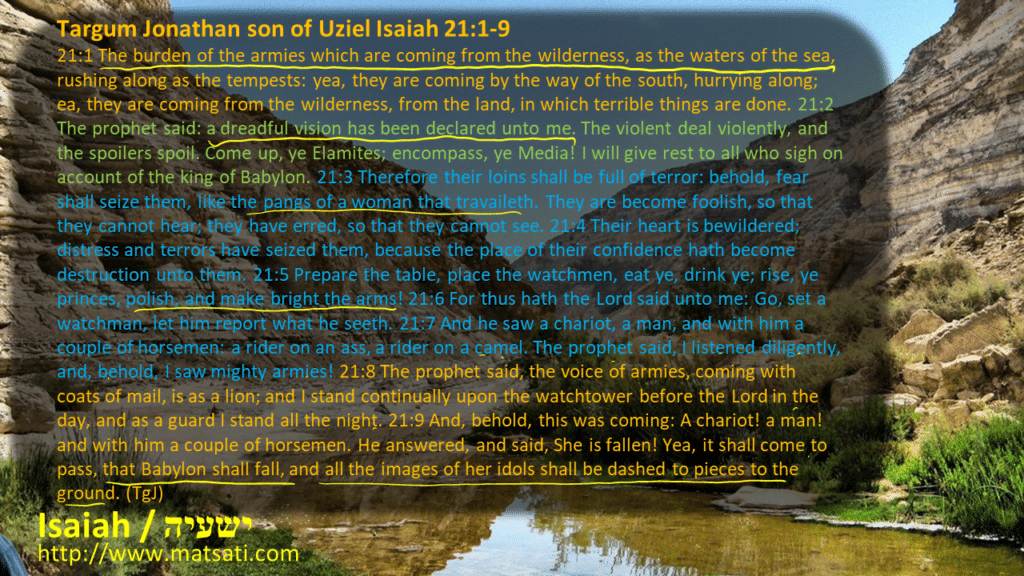
Targum Jonathan son of Uziel Isaiah 21:1-9
21:1 The burden of the armies which are coming from the wilderness, as the waters of the sea, rushing along as the tempests: yea, they are coming by the way of the south, hurrying along; ea, they are coming from the wilderness, from the land, in which terrible things are done. 21:2 The prophet said: a dreadful vision has been declared unto me. The violent deal violently, and the spoilers spoil. Come up, ye Elamites; encompass, ye Media! I will give rest to all who sigh on account of the king of Babylon. 21:3 Therefore their loins shall be full of terror: behold, fear shall seize them, like the pangs of a woman that travaileth. They are become foolish, so that they cannot hear; they have erred, so that they cannot see. 21:4 Their heart is bewildered; distress and terrors have seized them, because the place of their confidence hath become destruction unto them. 21:5 Prepare the table, place the watchmen, eat ye, drink ye; rise, ye princes, polish, and make bright the arms! 21:6 For thus hath the Lord said unto me: Go, set a watchman, let him report what he seeth. 21:7 And he saw a chariot, a man, and with him a couple of horsemen: a rider on an ass, a rider on a camel. The prophet said, I listened diligently, and, behold, I saw mighty armies! 21:8 The prophet said, the voice of armies, coming with coats of mail, is as a lion; and I stand continually upon the watchtower before the Lord in the day, and as a guard I stand all the night. 21:9 And, behold, this was coming: A chariot! a man! and with him a couple of horsemen. He answered, and said, She is fallen! Yea, it shall come to pass, that Babylon shall fall, and all the images of her idols shall be dashed to pieces to the ground. (TgJ)
It is interesting here how Isaiah writes מַשָּׂא מִדְבַּר-יָם “the burden of the wilderness of the sea” whereas the Targum Jonathan writes א מַטְלָן מַשרְיָן דְאָתיָן מִמַדבְרָא כְמֵי יַמָא דְנָגְדִין כְעַלעוּלִין אָתַן בְאֹורַח דָרֹומָא מִידַבְרִין וְאָתַן מִמַדבְרָא מֵאַרעָא דְאִתעְבִידָא בַה חַסִינָן׃ 21:1 The burden of the armies which are coming from the wilderness, as the waters of the sea, rushing along as the tempests: yea, they are coming by the way of the south, hurrying along; yea, they are coming from the wilderness, from the land, in which terrible things are done. (TgJ) Jonathan interprets this as the burden of the armies literally saying טְלָן מַשרְיָן דְאָתיָן מִמַדבְרָא כְמֵי יַמָא “the journeys of the soldiers to befall the wilderness like the waters of the sea.” The army rushes into a nation as the rushing waters of the sea indicating that this is an unstoppable force. We note that the desolation that comes as a result of the invading army, this is why Isaiah said, ב אְמַר נְבִיָא נְבוּאָה קַשיָא אִתחַוַה לִי אָנֹוסַיָא מִתאַנסִין וּבָזֹוזַיָא מִתבָזְזִין סַקוּ עֵילֹומָאֵי תַקִיפֵי מָדָאֵי כָל דַהְוֹו מִתאָנְחִין מִן קֳדָם מַלכָא דְבָבַל אְנַחִית לְהֹון׃ 21:2 The prophet said: a dreadful vision has been declared unto me. The violent deal violently, and the spoilers spoil. Come up, ye Elamites; encompass, ye Media! I will give rest to all who sigh on account of the king of Babylon. (TgJ) Violent death is the outcome of war, this is how Isaiah warns the people on the importance of cleaving to God as opposed to the neighboring nations. Moshe wrote in the Torah according to Parashat Vaetchanan (Devarim / Deuteronomy 4:4) וְאַתֶּם֙ הַדְּבֵקִ֔ים בַּיהוָ֖ה אֱלֹהֵיכֶ֑ם חַיִּ֥ים כֻּלְּכֶ֖ם הַיּֽוֹם׃ “and you who cleaved to the Lord your God are all alive today.” We note the Torah perspective that Isaiah is providing us concerning the wilderness. The מִדְבַּר-יָם wilderness-sea speaks to what happened in the Torah, how those who rejected the Lord died in the wilderness, it consumed them. And those who הַדְּבֵקִ֔ים “cleaved” to the Lord lived. This Hebrew word דְּבֵקִ֔ים means cleaving and refers to communion with God. The LXX translates ὑμεῖς δὲ οἱ προσκείμενοι κυρίῳ τῷ θεῷ ὑμῶν ζῆτε πάντες ἐν τῇ σήμερον where the word προσκείμενοι is a verb written in the present passive participle, plural, nominative, masculine form which means to “maintain allegiance to” or of “being faithful, steadfast, and obedient.” These things speak of those who cling or stick to the Lord. Modern Hebrew דבק means “glue” and comes from the same root word. The Torah perspective speaks to the need for repentance and for moral and ethical living and that these things are not possible if we are not הַדְּבֵקִ֔ים cleaving to the Lord God of Israel! Without the help of God, only unless we cleave to the Lord God in heaven and to His Messiah Yeshua, we will not be able to overcome this world. The author of Hebrews wrote “Take care, brothers, lest there be any of you an evil, unbelieving heart, leading you to fall away from the living God, but encourage one another every day, as long as it is called today, so that none of you may be hardened by the deceitfulness of sin.” (Hebrews 3:12-13) This is a Torah based perspective, to watch, and to cleave unto the Lord because sin will lead us away from the Lord God in heaven and draw us to greater and greater levels of sin. The Zohar 1:60 writes the following:
Zohar 1:60a:5
Rabbi Elazar opened his discourse “Come, behold the works of Hashem, who has made desolations in the earth” (Tehilim 46:9). “Come, behold (Heb. חֲזוּ)”: what is the meaning of “behold?” It is related to the verse, “a grievous vision (Heb. חָזוּת) has been declared to me (Yeshayah 21:2). Because by His deeds, the Holy One, blessed be He, reveals his prophecy to man. And when a prophecy is revealed by preceding grievous deeds, it is called ‘a grievous vision.’ “Who has made desolations (Heb. שַׁמּוֹת)” assuredly alludes to names (Heb. שֵׁמוֹת), for a name is the cause of everything that happens.
Here the Zohar speaks of the Lord who is the one who brings desolations upon the earth according to Tehillim / Psalms 46. This reminds us of Isaiah 45:7 and Amos 3:6 that states God creates evil.
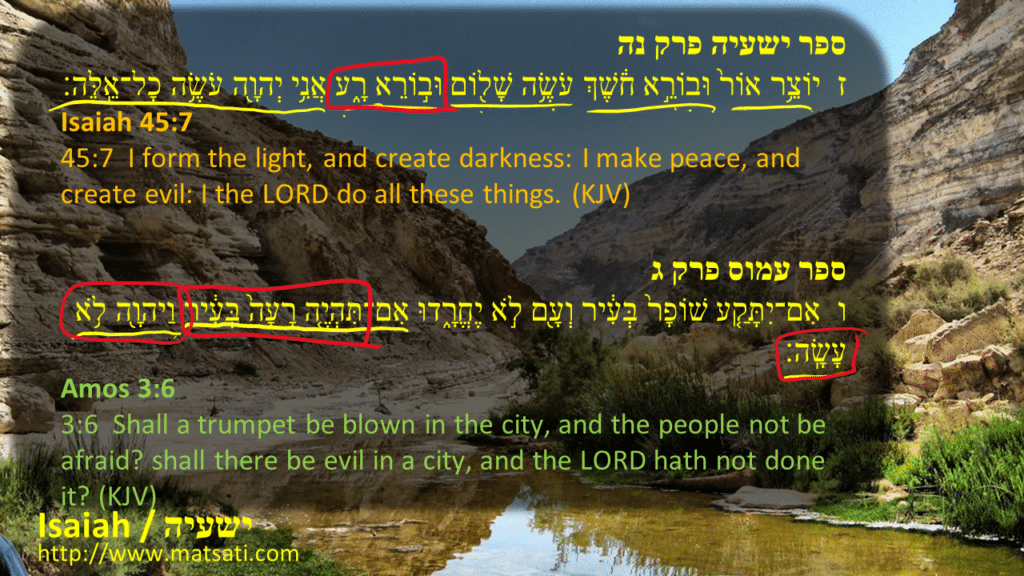
ספר ישעיה פרק נה
ז יוֹצֵ֥ר אוֹר֙ וּבוֹרֵ֣א חֹ֔שֶׁךְ עֹשֶׂ֥ה שָׁל֖וֹם וּב֣וֹרֵא רָ֑ע אֲנִ֥י יְהוָ֖ה עֹשֶׂ֥ה כָל־אֵֽלֶּה׃
Isaiah 45:7
45:7 I form the light, and create darkness: I make peace, and create evil: I the LORD do all these things. (KJV)
ספר עמוס פרק ג
ו אִם־יִתָּקַ֤ע שׁוֹפָר֙ בְּעִ֔יר וְעָ֖ם לֹ֣א יֶחֱרָ֑דוּ אִם־תִּהְיֶ֤ה רָעָה֙ בְּעִ֔יר וַיהוָ֖ה לֹ֥א עָשָֽׂה׃
Amos 3:6
3:6 Shall a trumpet be blown in the city, and the people not be afraid? shall there be evil in a city, and the LORD hath not done it? (KJV)
In order to understand this we have to note something about the study of ontology. In the study of ontology, there is the concept of ontological formations that refers to formations of social relations understood as dominant ways of living. Temporal, spatial, corporeal, epistemological, and performative relations are taken to be central to understanding a dominant formation. The ontological formation is based on how ontological categories of time, space, embodiment, knowing and performing are lived objectively and subjectively. So we are talking about something that is at the core of those who serve evil as opposed to righteousness and truth. From this perspective, we know that God does not create ontological evil. The Lord God does not put it within the heart of a man to commit sin in his heart which is then lived out in his or her life. So the question is what exactly are Isaiah 45:7 and Amos 3:6 speaking of? Well according to these verses, the Lord God brings evil against a nation that sins. God creates “calamity” which is translated in old English as “evil.” The purpose of bringing or visiting evil/calamity upon a people is meant for the fulfillment of the Torah command, that if one sins and is unrepentant, then destruction will follow. This holds true for everyone today just as it did back in the day of the writing of the Scriptures! This is the fear of the Lord, and when one lives in unrepentant sin, the outcome draws in what Isaiah says according to the TgJ, ג עַל כֵן אִתמְלִיאוּ חַרצֵיהֹון זְיָעָא דַחלָא אְחַדַתנוּן הָא כְחִבלִין לְיָלֵידתָא אִיטְפַשוּ מִלְמִשמַע טְעֹו מִלְמִחזֵי׃ 21:3 Therefore their loins shall be full of terror: behold, fear shall seize them, like the pangs of a woman that travaileth. They are become foolish, so that they cannot hear; they have erred, so that they cannot see. ד טְעָא לִיבְהֹון עָקָא וּבֵיעוּתִין אְחַדוּנוּן אְתַר בֵית רוּחצָנְהֹון הְוָה לְהֹון לִתבָר׃ 21:4 Their heart is bewildered; distress and terrors have seized them, because the place of their confidence hath become destruction unto them. ה סַדַרוּ פָתוּרִין אְקִימוּ סָכֹואִין אְכוּלוּ שְתֹו קוּמוּ רַברְבַיָא מְרִיקוּ וְצַחצַחוּ זֵינָא׃ 21:5 Prepare the table, place the watchmen, eat ye, drink ye; rise, ye princes, polish, and make bright the arms! ו אְרֵי כִדנָן אְמַר לִי יוי אִיזֵיל אְקֵים סָכֹואָה דְיִחזֵי יְחַוֵי׃ 21:6 For thus hath the Lord said unto me: Go, set a watchman, let him report what he seeth. ז וְיִחזֵי רְתַך אְנָש וְעִמֵיה זֹוג פָרָשִין רָכֵיב עַל חְמָר רָכֵיב עַל גְמָל אְמַר נְבִיָא אַצֵיתִית אַצָתָא וַחְזֵית וְהָא מַשרְיָן סַגִיאָן אָתיָן׃ 21:7 And he saw a chariot, a man, and with him a couple of horsemen: a rider on an ass, a rider on a camel. The prophet said, I listened diligently, and, behold, I saw mighty armies! (TgJ) The idea here is sin brings with it fear, whereas trusting in the Lord God Almighty brings peace. The watchman sees a man with a couple horsemen and TgJ interprets this as an army approaching. Rashi speaks of this being that of Persia and Media and the imminent fall of Babylon.
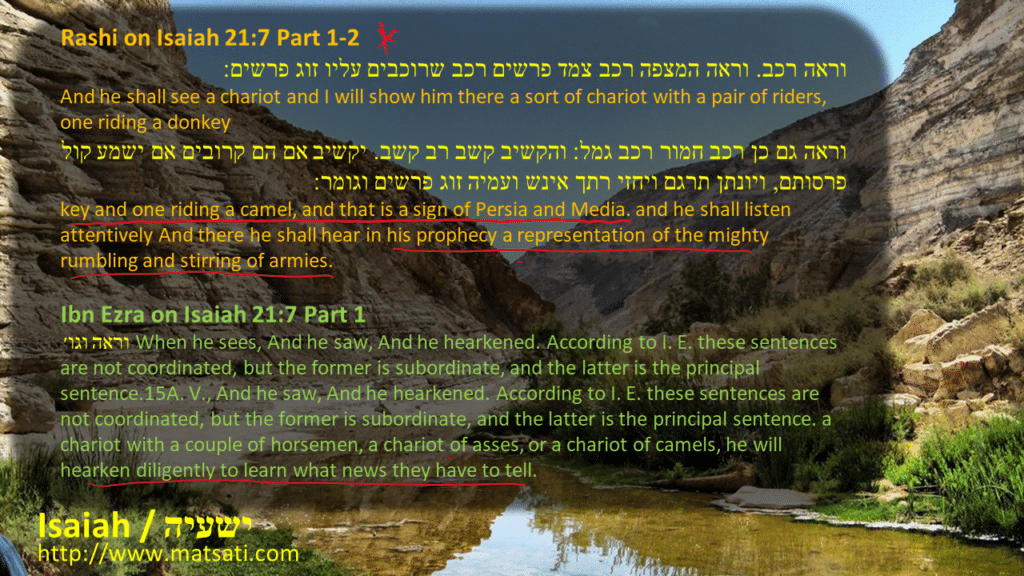
Rashi on Isaiah 21:7 Part 1-2
וראה רכב. וראה המצפה רכב צמד פרשים רכב שרוכבים עליו זוג פרשים:
And he shall see a chariot and I will show him there a sort of chariot with a pair of riders, one riding a donkey and one riding a camel, and that is a sign of Persia and Media.
וראה גם כן רכב חמור רכב גמל: והקשיב קשב רב קשב. יקשיב אם הם קרובים אם ישמע קול פרסותם, ויונתן תרגם ויחזי רתך אינש ועמיה זוג פרשים וגומר:
and he shall listen attentively And there he shall hear in his prophecy a representation of the mighty rumbling and stirring of armies.
The commentaries on Isaiah 21:7 speak to this as being one bringing a message, as a messenger. This is how Ibn Ezra interprets this verse saying the following:
Ibn Ezra on Isaiah 21:7 Part 1
וראה וגו׳ When he sees, And he saw, And he hearkened. According to I. E. these sentences are not coordinated, but the former is subordinate, and the latter is the principal sentence.15A. V., And he saw, And he hearkened. According to I. E. these sentences are not coordinated, but the former is subordinate, and the latter is the principal sentence. a chariot with a couple of horsemen, a chariot of asses, or a chariot of camels, he will hearken diligently to learn what news they have to tell.
This idea of the chariot, horsemen, donkeys, camels, all diligently coming, Ibn Ezra analogizes to bringing news. One of the purposes of the Scriptures is to remind us that the Lord God watches over all things, and that everything exists by virtue of His mercy, grace, and sovereign purposes. The bringer of good news is always a welcome thing. When something genuinely good happens to someone, it is customary to recite the HaMetiv Blessing: ברוך אתה יהוה אלוהינו מלך העולם הטוב והמטיב “Blessed are you Lord our God King of the universe who is good and who does good.” These things remind us of the powerful hand of God that is involved in all things. Here in Isaiah’s case, there are the messengers of warning due to the coming of tragedy. We understand that these events come due to the judgment of God, and God is a fair judge. These things that happen are all made perfectly and righteously. These messengers bring with them the invading armies who are described in the following way according to TgJ, ח אְמַר נְבִיָא קָל מַשרְיָן דְאָתיָן בְסִיטוּנְהֹון מֵאַריֵי עַל סָכוּתָא קֳדָם יוי אְנָא קָאֵים תְדִירָא בִימָמָא וְעַל מַטַרתִי אְנָא מְעַתַד כָל לֵיליָא׃ 21:8 The prophet said, the voice of armies, coming with coats of mail, is as a lion; and I stand continually upon the watchtower before the Lord in the day, and as a guard I stand all the night. ט וְהָא דֵין אְתָא רְתַך אְנָש וְעִמֵיה זֹוג פָרָשִין וַאְתֵיב וַאְמַר נְפַלַת וְאַף עְתִידָא לְמִיפַל בָבַל וְכָל צַלמֵי טָעְוָתַהָא יְדַקְקוּן לְאַרעָא׃ 21:9 And, behold, this was coming: A chariot! a man! and with him a couple of horsemen. He answered, and said, She is fallen! Yea, it shall come to pass, that Babylon shall fall, and all the images of her idols shall be dashed to pieces to the ground. (TgJ) Here the TgJ interprets the armies as coming to destroy the Babylonian idols and those who worship those idols. The original text for Isaiah 21:8 states, וַיִּקְרָא אַרְיֵה עַל-מִצְפֶּה | אֲדֹנָי אָנֹכִי עֹמֵד תָּמִיד יוֹמָם וְעַל-מִשְׁמַרְתִּי אָנֹכִי נִצָּב כָּל-הַלֵּילוֹת “And he cried, A lion: My lord, I stand continually upon the watchtower in the daytime, and I am set in my ward whole nights.” Here the TgJ interprets the lion as paralleling the army who will come to devour the people. Ibn Ezra interprets these things saying the following concerning Isaiah 21:8-9.
Ibn Ezra on Isaiah 21,8 Part 1
אריה A lion. According to the Midrash, Habakkukis meant, because חבקוק ═ אריה taking the arithmetical value of the letters.17The arithmetical value of the letters of the word אריה, is 1 + 200 + 10 + 5 ═ 216, that of חבקוק, 8 + 2 + 100 + 6 + 100 ═ 216. Our attention is called to this arithmetical equation, as if Isaiah foreshadowed a prophecy of Habakkuk in similar terms. See Rashi ad locum. I think ב must be supplied; comp. אש אוכלה as a consuming fire18A. V., A consuming fire. (Deut. 4:24). The watchman called with a loud voice like a lion.
Ibn Ezra on Isaiah 21,9 Part 3
Babylon is fallen, is fallen. The repetition indicates that no remnant has been left to her.
We note that Babylon today lies in ruins and the lion who devoured the army that was brought led to the destruction of the people not leaving even a remnant of people. The idea here is that Judah and Jerusalem also fell due to her sins, but there remained a remnant, whereas Babylon fell, and nothing remained! We note what the NT text writes, saying that the good news of the gospel is called a “doctrine of godliness.” In addition, the Torah is far from being made void through faith, it is in fact established by faith by the power of the indwelling presence of God in our lives. (See Romans 3:31) Forty percent of the Torah consists of the commands related to the Temple service, there remains sixty percent that is pertinent to us today, related to ethical and moral living. We note that we literally cannot fulfill the Torah of Moshe in all of its particular details concerning the Temple observance, or the establishment of the theocratic kingdom, and so on. The point is related to our relationship with God our Father in heaven and His Messiah Yeshua. In Covenant Theology, there is the belief that there is a covenant of works and a covenant of grace. The point is when we study the scriptures and take a step back and get the big picture, we can see how the grace and mercy of God has been present throughout scripture from since the beginning of creation! The reason this is so because the Lord God is showing us exactly what He is going to do in the Messiah Yeshua. The deliverance of a mixed multitude from Egypt, working miracles, drawing the people close to Him at his holy mountain, all of these things were done for the people who had not yet entered into a covenant relationship with God. Then in Shemot / Exodus 19, Moshe asked if the people were willing to enter into a covenant with God and they answered Yes by faith. Then and only then did God give the people His Torah which describes how they should live being in a relationship with God and His dwelling in their midst. This is the context of matan Torah, the giving of the Torah to the mixed multitude. Note that the mixed multitude = Jew and Gentile. This provides a future expectation of what God is going to do and of the gift of salvation through faith! So, what does God expect of us from a Torah perspective? To love mercy and truth, to express holiness in our approach to life, to seek the God of Israel, and to believe in the Messiah Yeshua, and to live our lives for the glory of God walking in His holy and righteous ways according to the Scriptures, and to avoid idolatry. These are the basic conclusions of the disciples according to Acts 15! These things speak to having a relationship with God and the fruit of the Spirit of God which leads towards righteousness, not away from it. Righteousness is not contrary to the Torah because Paul wrote that “If you are led by the Spirit, you are not under the law… the fruit of the Spirit is love, joy, peace, patience, kindness, goodness, faithfulness, gentleness, self-control; against such things there is no law. And those who belong to Yeshua the Messiah have crucified the flesh with its passions and desires. If we live by the Spirit, let us also keep in step with the Spirit.” (See Galatians 5:18-25). The idea of being under the law means that one is being judged by the law due to sin, this is why Paul wrote in the same context that against such things there is no law, meaning that there is no guilt due to violating the commands. The role of the Spirit of God is to lead us into all righteousness and truth, and this is consistent with a Torah based approach. This is the power of God in our lives by faith in Yeshua the Messiah! This is how we understand the Torah, not as a covenant of works. The Torah is a covenant relationship with God who lives in the midst of His people. This is the Gospel Message Yeshua was teaching that was taught according to the Torah. This is the power of God in our lives where the Holy Spirit of God draws us into Torah for the glory of God in heaven through faith in Yeshua the Messiah!




